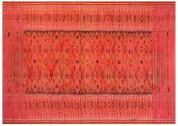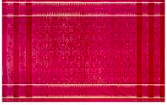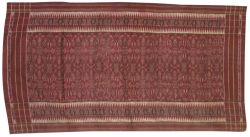Cepuk
- a kind of ikat cloth or fabric whose base color is red (Mider) en
- "Ceremonial protective textile - weft ikat, woven silk or cotton follows resembles the layout of a patola (kain bebali). Wastra, silk with cepuk design - for special ceremonies (kain bebali)." en
- sejenis kain ikat yang warna dasarnya merah (Mider) id
- kain khas dari Nusa Penida (Mider) id

Cepuk textile, cotton Nusapenida - size: 81 x 125 cm

No translation exists for this example.

Cepuk based on Indian double ikat patola prototype cloth. Bali, Indonesia, 1938. Cotton. Cotton; handwoven endek (weft ikat or tie-dyed, resist patterned) 59 7/ 8 x 32 1⁄4 in. (152 x 82 cm). Courtesy of the Division of Anthropology, American Museum of Natural History, 70.0/8256. Donated by Margaret Mead. The eight-pointed star pattern is called chhabadi bhat in India and jilamprang in Indonesia.

Cepuk Bintang Kurung, Ngurah Hendrawan, dyer, and Ni Gede Diari, weaver, Nusa Penida, Bali, Indonesia, 2017. Cotton, natural dyes; handwoven plain-weave endek (weft ikat or tie-dyed, resist patterned), 95 1⁄4 x 30 3⁄4 in. (242 x 78 cm). Used as protection in toothfiling (potong gigi) ceremonies.





